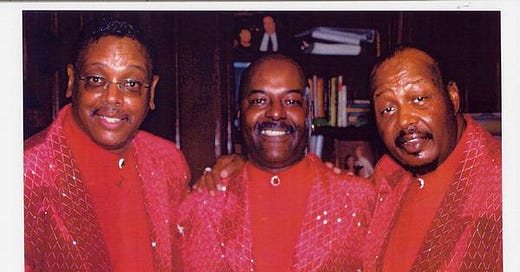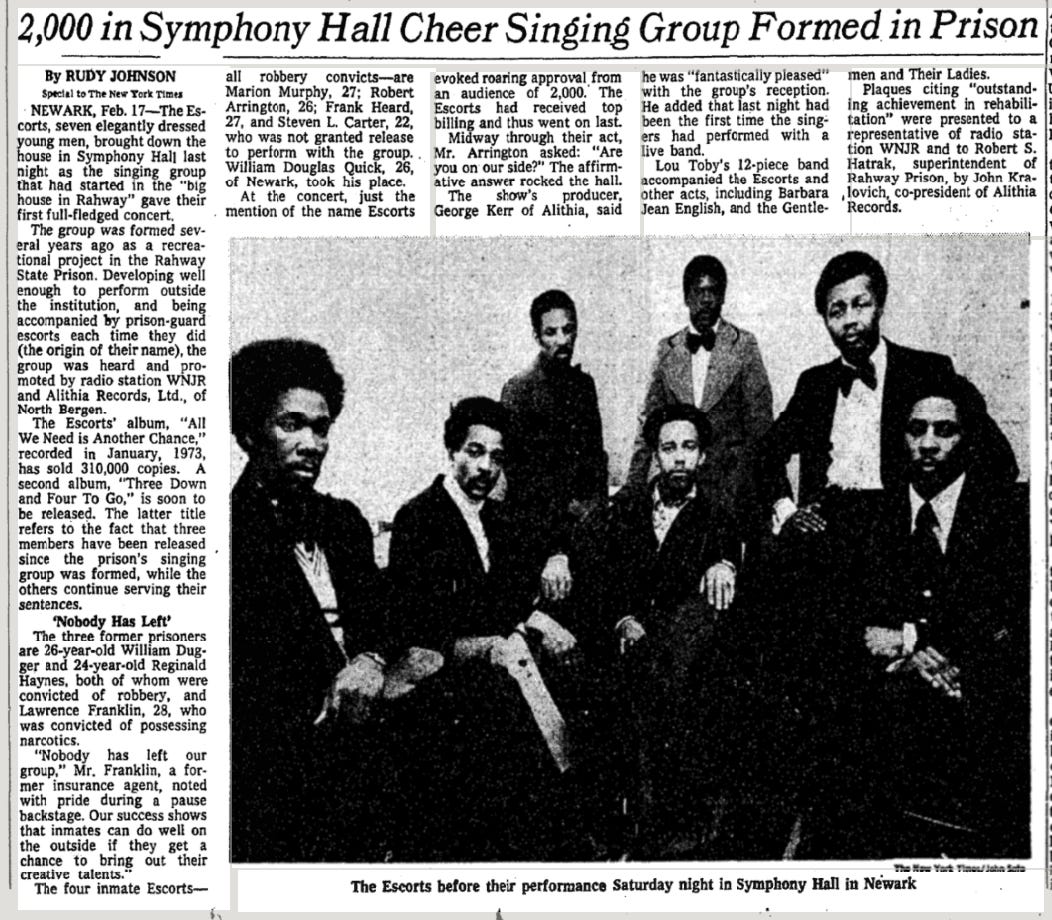The unlikely story of The Escorts started in a New Jersey state prison in 1968. The group's founder, Reginald "Reggie" Haynes, was incarcerated at 18 years old for robbery and found purpose inside the walls of Trenton State Prison through soul music. He and several other inmates would practice doo-wop music in their free time. After transferring to Rahway State Prison, Haynes found a group of 6 other men who were passionate about music as well, and they named themselves The Escorts. As a group, they had ambitions of performing and were denied several times. However, through their perseverance, they were eventually able to perform. Their breakthrough came in a prison talent show, where soul singer Linda Jones, who was the sister of another inmate brought the legendary producer George Kerr. Kerr was behind iconic hits such as "Hypnotized" by Jones along with soulful classics by the likes of Phyllis Hyman, The O'Jays, and The Whatnauts. In an interview, Kerr says he walked up to the group of men and said, "I want to do something that's never been done in the history of the entertainment world. I want to record The Escorts in Rahway State Prison."
Recording the group proved to be a challenging goal for Kerr as he was met with resistance from prison staff. Kerr says it took him writing 500 letters and a meeting with the Superintendent of prisons in DC for him to be allowed to record the Escorts in a mobile recording truck years after the talent show. The truck was where the group recorded their first album, "All We Need Is Another Chance," in just over 14 hours. Covers of "Look Over Your Shoulder" and "I'll Be Sweeter Tomorrow" by the O'Jays ended up charting in the R&B Top 100.
The most compelling song on the album is the title track, "All We Need (Is Another Chance)," which explores themes of redemption and rehabilitation in the context of their background as convicts. At the song's beginning, Kerr starts with a monologue pleading to listeners. "Whoever is on the outside, whoever is listening to this conversation. These guys, The Escorts, feel and have told me. Each and every one of them that they are sorry for what they have done. That's why the title song to this album is “All We Need Is Another Chance.” And I'm just asking you, please give it to them."
Miraculously, The Escorts were given that second chance. Songs from their first album were played on the radio, and they received several letters from fans who wanted to see them perform live. The group was eventually able to perform at a sold-out show in Newark Symphony Hall. Being able to leave prison to perform in tuxedos and without handcuffs was unheard of for black inmates at a maximum security prison in the 1970s.
As time passed, the Escorts underwent many changes, with several members being transferred to other prisons or simply losing interest in singing with the group. It's even said that the group heard on the first album differs from the group discovered at the prison talent show. One notable change was Reggie Haynes becoming the first member to be released in 1973.
From the outside, Haynes was able to promote the group's work. Eventually, two other group members were released along with him, inspiring the title of their second album, "3 Down, 4 To Go". The three free men would return to Rahway State Prison to record with the four other men. This album featured many more covers of iconic soul ballads, including one of The Whatnauts' "I Can't Stand To See You Cry." Their version is known for being sampled in J Dilla's "Don't Cry."
Hayes, who is sadly no longer with us, often credited the group for his ability to start a new life upon release and toured with a version of the group called "The Legendary Escorts." In the face of daunting odds, the Escorts' journey is a testament to their resilience. The mere existence of their music is an act of resistance. These men defied the purpose of their institutionalization, embracing joy in a place surrounded by the echoes of despair and the weight of isolation. Rahway Prison, where the state's death row resided, was their backdrop, yet they rose above that misery through music.






